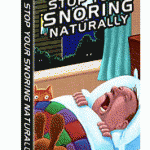Stop snoring surgery is not suitable for all snorers. Many people snore. Research indicates that up to 70 percent of the population are snorers. Some snore occasionally and some constantly and very loudly but not all of them will benefit from stop snoring surgery.
What causes snoring?
Snoring is caused when the soft tissue of the upper palate and sometimes the tongue relaxes during sleep and falls against the back of the throat, partially blocking the airway. When breathing, the air passing over this tissue vibrates making the noise recognized as snoring.
This is the most common cause of snoring and is often a symptom of obstructive sleep apnea, a condition where the sufferer stops breathing because the airway becomes completely blocked by soft tissue. The snorer wakes up to resume breathing, often making gasping and choking noises. These episodes of blocked airway followed by gasping for air and waking to resume breathing can occur hundreds of times a night. The snorer is frequently not aware that these waking episodes occur and it is often the snorer’s partner who first becomes aware of the condition. Obstructive sleep apnea needs to be diagnosed by a doctor or sleep clinic before a recommendation for stop snoring surgery is considered. Click on this link to read more about sleep apnea.
The uvula, which is the small triangular or pear-shaped piece of skin that hangs from the back of the roof of the mouth, is also sometimes the cause of snoring. In either case, persistent and extremely loud snoring is often a sign of obstructive sleep apnea.
Stop Snoring Surgery Explained
A sleep clinic or doctor will almost always suggest trying other snoring remedies including the snoring chin strap, or snoring mouthguard for persistent snoring. The continuous positive airway pressure (CPAP) machine is frequently recommended for sufferers of sleep apnea. The CPAP machine provides continuous air pressure to the lungs during sleep which keeps the airways open and allows the sleep apnea sufferer to sleep through the night.
Any type of stop snoring surgery is usually the last resort to treat problem snoring. Mechanical methods are preferred and many remedies have been proven effective. However, in severe cases stop snoring surgery may be recommended for people with a more than usual amount of soft tissue blocking their airway.
Types of Stop Snoring Surgery
There are several different types of stop snoring surgery including:
Uvulopalatopharyngoplasty – UPPP involves the removal of the uvula and pharyngeal arches, partial removal of the soft palate, and sometimes removal on tonsils and adenoids. The procedure is performed under general anesthetic and research suggests that UPPP is often accompanied by severe post-operative pain. There may also be long-term complications and the procedure may not be effective in more than 40% of patients.
Laser-Assisted Uvuloplatoplasty – LAUP can be performed under local anesthetic and is considered to be more comfortable and economical, and safer than UPPP although the post-operative pain is still severe. LAUP patients may have to undergo the procedure several times to achieve the desired effect and the post-operative pain will be repeated. As with UPPP the success rate of this type of stop snoring surgery is not great.
Radio Frequency Tissue Ablation or Somnoplasty is designed to shrink excess tissue in the soft palate. This is a less invasive procedure and can be performed under local anesthetic as day surgery. Somnoplasty results in fewer complications and is much less painful than some other treatments. The patient usually requires several treatments and it is not as successful in overweight patients.
If a doctor determines that stop snoring surgery may be of benefit to the snorer, they may sometimes first try trimming excess tissue from the uvula. Often this is an effective method of opening the airway and ending snoring. It is also helpful in maintaining the air flow during sleep to reduce the waking time effects of OSA, such as drowsiness.
In other circumstances stop snoring surgery may be recommended to stiffen the tissue of the soft palate. The tissue is scarred with a laser, which helps tighten the tissue to prevent it from falling back into the throat.
While some of the methods used in snoring surgery can be performed on an outpatient basis with a relatively quick recovery time, some methods require a hospital stay of several days. There may be considerable post-operative pain for a week or more and the results for some stop snoring surgery procedures are neither long lasting nor effective.
Do You Snore? Do You Have A Partner Who Snores?
If your answer to either of these questions is yes, may be worth checking out the snoring Chin Strap. There is a 90 day money back guarantee.





